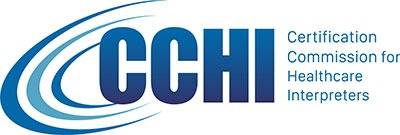In healthcare, where effective communication is critical, the need for qualified interpreters is undeniable, particularly for patients with Limited English Proficiency (LEP). The Certification Commission for Healthcare Interpreters (CCHI) sets the standard for excellence in healthcare interpreting. This certification is not merely an accolade but a reflection of an interpreter’s commitment to the highest standards of professionalism and competency. Here, we explore the significance of CCHI certification from a healthcare provider’s perspective and address common concerns about adopting certified interpreters.

Integrating CCHI-Certified Interpreters into Healthcare: A Strategic Move
The ongoing certification efforts by the Certification Commission For Healthcare Interpreters (CCHI) continue to play a pivotal role in elevating communication standards and care quality within healthcare settings. Atlas Language Services, Inc., remains a dedicated advocate for CCHI’s mission, acknowledging the significant strides made towards establishing a consistent benchmark for the competency and professionalism of language experts in the healthcare sector. This commitment underscores the industry’s progression beyond the initial phases of certification towards a more widespread adoption and recognition of certified healthcare interpreters.
The Importance of Certification in Healthcare Interpreting
While not currently mandated, the certification of healthcare interpreters is vital for several reasons:
- Assurance of Competency: Certification ensures that interpreters possess the necessary skills, knowledge, and ethical understanding required to facilitate effective communication between healthcare providers and patients, particularly those with Limited English Proficiency (LEP).
- Standardization of Quality: By adhering to a national standard, healthcare providers can be confident in the consistency and reliability of their interpreting services, leading to improved patient care and safety.
Challenges and Opportunities
The initial scarcity of certified interpreters presents challenges in meeting the demand, particularly for Language Service Providers (LSPs) like Atlas Language Services. However, there’s a strong belief in the industry that certification will become the norm, increasing the supply of qualified interpreters over time.
CCHI’s Certification Programs
The Certification Commission for Healthcare Interpreters (CCHI) offers three primary types of certifications for healthcare interpreters:
- CoreCHI™: This certification is available to interpreters of any language and assesses medical interpreters on core professional knowledge, critical thinking, ethical decision-making, and cultural responsiveness skills needed in any healthcare setting.
- CoreCHI-Performance™ (CoreCHI-P™): This second certification tier is also available to interpreters of all languages. It requires candidates to meet CCHI’s Language Proficiency criteria and pass two exams: the CoreCHI™ knowledge exam and the monolingual performance ETOE™ (English-to-English) exam.
- CHI™: The CHI™ certification is a language-specific performance certification available for Spanish, Arabic, and Mandarin interpreters. It focuses on interpreting skills and abilities, emphasizing all modes of interpreting in a healthcare encounter, sight translation and healthcare document translation.
By the end of 2021, CCHI had awarded 4,793 certifications, underscoring the growing recognition of the importance of certified interpreters in healthcare.
Why Healthcare Providers Should Value CCHI Certification
CCHI certification is a mark of distinction that signifies an interpreter’s proficiency, ethical integrity, and commitment to ongoing professional development. Here’s why healthcare providers should prioritize working with CCHI-certified interpreters:
Quality Care and Patient Safety: Certified interpreters are adept at navigating medical dialogues and ensuring accurate and effective communication between providers and patients, which is paramount for patient safety and quality care.
Ethical and Cultural Competence: CCHI-certified interpreters adhere to a strict code of ethics and are trained in cultural competence, ensuring respectful and sensitive communication that honors diverse backgrounds and beliefs.
Regulatory Compliance: With the Affordable Care Act, Title VI, and HIPAA emphasizing the importance of language access, employing certified interpreters helps healthcare providers meet these legal obligations, reducing liability risks.
Addressing Concerns for Healthcare Providers
Integrating CCHI-certified interpreters into healthcare settings is strategic, yet some providers may have reservations. Here are common concerns addressed:
1. Complexity and Cost: While integrating certified interpreters involves logistical considerations and potential costs, the investment significantly enhances patient care and can mitigate risks associated with miscommunication, ultimately proving cost-effective.
2. Maintaining Certification: The requirement for interpreters to pursue continuing education ensures they remain at the forefront of healthcare interpreting practices, continually enhancing their skills to benefit healthcare providers and patients alike.
3. Language Specificity: While the CHI™ certification is language-specific, the CoreCHI™ certification is universally applicable, ensuring providers can access qualified interpreters across a broad spectrum of languages.
The Impact of CCHI Certification on Healthcare
Working with CCHI-certified interpreters enhances the quality of patient care and contributes to a more inclusive and equitable healthcare environment. These interpreters facilitate clear, accurate, and culturally sensitive communication, essential for diagnosis, treatment, and patient satisfaction.
Conclusion
For healthcare providers, partnering with CCHI-certified interpreters is a step towards ensuring the highest standards of care for all patients, regardless of language barriers. It reflects a commitment to excellence in patient communication and care, underscoring the importance of understanding and empathy in healthcare delivery.
FAQs for Healthcare Providers
How does employing CCHI-certified interpreters benefit our healthcare facility?
Employing certified interpreters enhances communication accuracy, patient satisfaction, and compliance with healthcare regulations, contributing to overall patient safety and care quality.
What makes CCHI certification a reliable standard for interpreters?
CCHI certification is based on rigorous, standardized testing and adherence to industry-recognized ethical and professional standards, ensuring interpreters meet national benchmarks for quality and competency.
Can CCHI certification help in reducing healthcare disparities?
By ensuring effective communication, certified interpreters are crucial in addressing healthcare disparities among LEP populations and promoting equal access to quality care.
Are there financial incentives for healthcare facilities to employ certified interpreters?
While direct financial incentives vary, employing certified interpreters can improve healthcare outcomes and patient satisfaction, potentially reducing costs associated with miscommunications and non-compliance.
